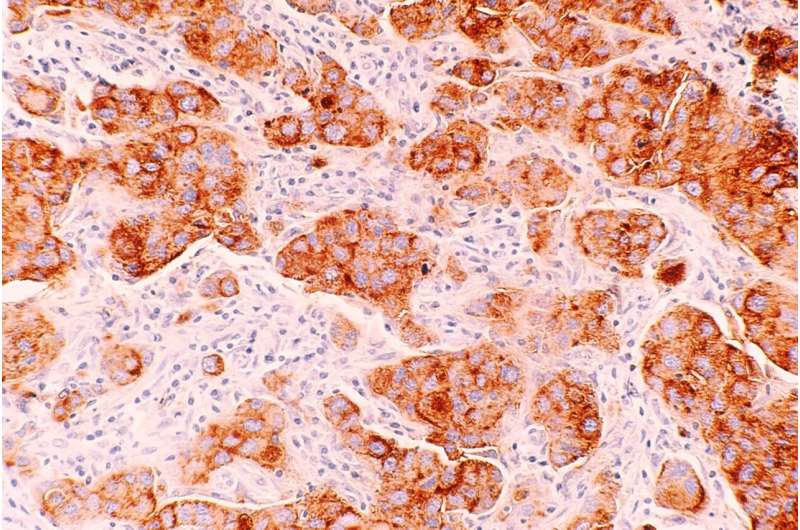
Advanced or metastatic estrogen receptor-positive (ER+) breast cancer is commonly treated with drugs that block the estrogen receptor. However, estrogens that stimulate the receptor can also be effective. Building on their previous studies, researchers at Dartmouth Cancer Center recently concluded a Phase II clinical trial aimed to test the efficacy of alternating between estrogen stimulation and estrogen deprivation in patients with metastatic ER+ breast cancer, and to identify tumor characteristics that predict who might benefit from this strategy.
The results, newly published ahead of print in Clinical Cancer Research, support cyclical estrogen/anti-estrogen therapy as a promising strategy to treat advanced/metastatic ER+ breast cancer.
The POLLY trial stands for “Phase II study of Pre-emptive oscillation of ER activity levels through alternation of estradiol/anti-estrogen therapies prior to disease progression in ER+/HER2- metastatic or advanced breast cancer.” Among 19 patients enrolled in the trial, 3 (16%) experienced tumor shrinkage during cyclical treatment and another 5 (26%) had disease stabilization for at least 24 weeks, yielding an overall benefit rate of 42%.
Treatments were well-tolerated, and no patients discontinued drug treatment due to side effects. Following cancer progression on cyclical treatment, 12 patients elected to receive non-cycling treatment with a single drug—5 of these patients (42%) had further disease stabilization lasting at least 24 weeks.
“Estrogen therapy has been used for more than 50 years to treat breast cancer. Strategies to maximize estrogen efficacy and minimize side effects, as well as research on cancers that develop resistance to the new tumor-targeted drugs coming to market in the past decade such as Ibrance, Kisqali, Verzenio and Afinitor, remain under-developed,” says Dartmouth Cancer Center breast oncologist and lead author Gary N. Schwartz, MD. “The POLLY study addressed this gap.”
“Tumor features called biomarkers that predict which patients will benefit from estrogen therapy have also not been reported,” adds cancer researcher and co-corresponding author Todd W. Miller, Ph.D.. “In the POLLY trial, we found that mutations in the gene encoding ER, which often arise in tumors that become resistant to anti-estrogen drugs, were present in tumors from the only two patients whose tumors shrank in response to estrogen therapy within the first 8 weeks. This suggests that ER mutations may be useful in identifying patients who are likely to benefit from this treatment strategy.”
The team will build on POLLY findings by conducting a follow-up clinical study, “Estradiol therapy to target ER-mutant and ER-wild-type ER+ metastatic breast cancer (ESTHER),” that will test the effectiveness of estrogen therapy in patients with or without tumor mutations in ER.
Dartmouth Health

